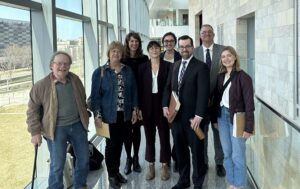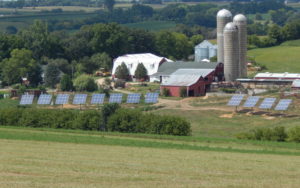Petoskey News-Review
Dunn Energy Co-op Downsville, Wisconsin
Agriculture is the heart of the Midwest, but rural communities face many threats, from contaminated waterways and soil erosion, to pesticide misuse, irresponsible waste management, and sprawl. Family farmers have economic pressures on all sides, while large corporate landowners neglect traditional stewardship practices in the name of short-term profits, affecting quality of life for their downstream neighbors.
ELPC knows how valuable rural communities are for environmental sustainability and economic progress in our region. We work to advance rural clean energy opportunities, monitor state and federal permits to hold polluters accountable, and represent farmers and farmworkers in the fight for safe clean air and water. These efforts help to ensure a sustainable and just agricultural system that reduces emissions, supports rural communities, and protects the Midwest’s natural resources and public health.

ELPC with farmers and advocates defending Swampbuster program in Iowa
Wetlands help to filter our water, absorb climate emissions, and make agricultural communities more resilient to flooding and extreme weather events by acting as natural sponges. ELPC is working in multiple states to protect these critical ecosystems and the communities who depend on them. After the Supreme Court’s disastrous Sackett decision stripped wetlands protections from the Clean Water Act, ELPC and partners have stepped up to advance state-level wetlands legislation to fill the gap.
In our most recent win, a federal judge in Iowa sided with ELPC and a coalition of agriculture groups in a lawsuit over the longstanding Swampbuster provision of the Farm Bill, which incentivizes farmers to help protect wetlands. “Everybody pays a price when wetlands are lost,” said ELPC Staff Attorney Katie Garvey, “but those who live downstream will pay the highest costs. This decision is a win for family farmers who know that Swampbuster is fair, makes sense, and is worth protecting.”
Concentrated animal feeding operations (CAFOs), also known as factory farms, are not like the family farms of popular imagination. Thousands of animals are confined in tight quarters, producing far more waste than the nearby land can handle. Their excess manure taints waterways throughout the Midwest, loaded with nutrients that become dangerous at high levels: nitrogen is linked to cancer and birth defects, while phosphorus fuels green clouds of algae, threatening drinking water, impairing recreation, and damaging local economies. CAFOs are poorly regulated and poorly understood by both the public and policy makers, so ELPC is working in multiple states to improve oversight and enforcement and hold the worst polluters responsible.
After a toxic algal outbreak in Lake Erie shut down Toledo’s water supply in 2014, ELPC stepped up to protect the Great Lakes from the manure pollution fueling the algae. As a result of our first lawsuit in 2017, Ohio EPA declared western Lake Erie officially “impaired” in 2018, which was the first step in creating a cleanup plan. More lawsuits followed, as state and federal lawmakers have dragged their feet every step of the way. We will continue to represent Ohio communities in their fight for clean water until a strong and meaningful cleanup plan is in place.
ELPC also engages with state and federal permits in multiple states to create a more effective regulatory framework. CAFOs are only economically viable because the law allows them to externalize their environmental, social, and human health costs onto the general public. Our goal is to see CAFOs treated like other industrial polluters, who must pay to clean up their own mess. That way, more sustainable and regenerative approaches to agriculture will not suffer from the systemic, economic disadvantages that currently make it hard for them to compete with “cheap,” CAFO-produced meat.
Farmworkers are an essential and often overlooked part of the Midwestern economy. They take food from fields to supermarkets to keep us all fed, doing manual labor outdoors in wide-ranging weather conditions where they can also be exposed to hazardous doses of pesticides. After a group of farmworkers in Illinois were sprayed with pesticides in 2019 and their healthcare needs were ignored by their employers, ELPC stepped up in two ways. We partnered with Legal Aid Chicago and Texas RioGrande Legal Aid to represent the workers in federal court, and we advanced legislation through the Illinois General Assembly to improve protections and prevent this from happening again.

Solar panels on a Wisconsin farm
ELPC helped create the Farm Bill’s first-ever clean energy programs in 2002, and ever since this work has only grown. The Rural Energy for America Program (REAP) has helped bring clean energy and energy efficiency investments to thousands of farmers, ranchers, rural electric coops, and small businesses across the country. The message is out there that the wind and the sun can be harvested alongside grain and livestock. Every year, demand outstrips supply for the Rural Energy for America Program (REAP), because rural communities want to be part of America’s green energy landscape.